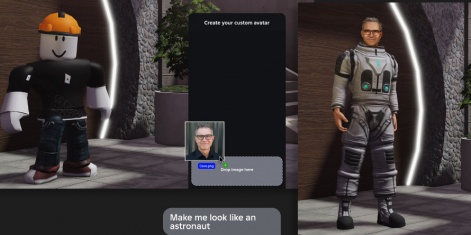The gaming industry has seen a massive uptake in the use of AI over the past year, with use cases across sectors from marketing to asset creation and game development. One such platform using new AI technologies is Roblox. Built from its user's creations, Roblox is utilising numerous forms of AI to grant the platform's creators more freedom and a seamless means to connect with each another.
To find out more we spoke with Roblox’s chief scientist, Morgan McGuire, to discuss how Roblox is using the power of AI to support its community of developers, from generative AI avatar and texture creation to code assistance and real-time AI chat translation. McGuire also touches on the ethical use of AI, how it acts as a supplement to creativity, not a replacement, and shares some insight into the future for the platform.
PocketGamer.biz: You were previously at Nvidia. What brought you over to Roblox, and what's your day-to-day as Chief Scientist?
Morgan McGuire: My lifelong professional goal is using science and engineering to help others make beautiful 3D worlds.
Roblox is a great company for this. We enable millions of creators and tens of millions of players around the world every day. Being here is a unique opportunity in the industry to make a difference to all kinds of creators. That’s both professional level and monetised creation, as in the traditional entertainment industry. But it is also about creation by everyone, everywhere. That means hobbyist and student 3D creation with the same platform and tools. So, for me, Roblox is a perfect place to be. I’ve served in many roles at the company. I currently help lead our AI, research, and open-source teams. That’s exciting because it means working with diverse teams across the company to grow our platform and learn from each other.
This is a revolution in human communicationMorgan McGuire
You mentioned leading AI research for Roblox; what can you tell us about how Roblox uses AI and in which areas it is being used?
Roblox has applied AI to three different areas. The foremost is safety - making sure content and interactions are appropriate for each user and specific to their region and age.
We’ve also applied it to enhancing communication. For example, we built natural language translation so that you can send a message in your first language, and others will receive it in their language in real time without having to run an explicit translation app or wait. That connects people online who wouldn’t be able to understand each other in person. This is a revolution in human communication.
And then there’s full-blown 4D creation. With avatar auto-set-up, texture generator, code assist, and Roblox assistant, we’re making it so anyone can create anything on the Roblox platform, and the only limit is their own creativity.
And what about the most recent updates you’ve had with Roblox’s GenAI? There are new ways to allow users to create 3D avatars, chat translation and even a code assist tool. How is this all made possible in a way that is accessible to everyone, and how do you monitor the progression of such AI tools to ensure they are accurate?
There are different ways to measure accuracy for creation. One is whether you are satisfied with the end result of a tool. But another is whether you created what you were originally trying to. Those are different! We saw that many AI tools outside of Roblox could make impressive images or models, but they were very hard to control and execute based on your own specific vision. We’ve invested significant development into making Roblox’s Generative AI tools controllable so that the result looks good on its own and matches the creator's intent.
Finally, a good creation tool will push you to discover new ideas and be a partner in creation - rather than just creating on its own from a trivial input.

In arts with natural media such as paintbrushes or charcoal, there are happy accidents that come from using them. That can help you think about new options and push your creativity. To me, that’s a sign of a really great tool. It should be controllable but also incorporate some natural randomness and controlled chaos. So, we aspire to find ways to eventually make our GenAI tools leverage nondeterminism, create new options beyond their inputs, and ask you questions back to ensure AI creation is truly interactive and exploratory.
More practically, how do we measure success for GenAI? Take code assist as an example - we’ve seen 300 million tokens, which are similar to words of source code, generated for developers. We then track how many of those developers accepted, rejected, and accepted and modified. This all gives us valuable quantitative insight into how the tool is performing.
But creativity and workflow also must be evaluated subjectively. So, the key is our dialogue with the creator community. By inviting creators to our office, our Roblox developers conference, and our online forums, we are constantly incorporating feedback on how these tools meet the community's needs.
Part of the appeal of AI is that you only need a good idea to create, and AI can help facilitate the ideas you have, even in areas you’re perhaps not familiar with. While this means there is potential for more people to create, is there any drawback on developers who have trained their skills for years? Or is it simply another tool they can use to create even quicker?
Generative AI can really help with the most time-consuming parts of creation and can lift the floor on quality for everyoneMorgan McGuire
There are three levels here. One, we all have creativity in our lives; we’re all expressive, including choosing an outfit, what music to play, and what we text to our friends. So, everyone has ideas to share, whether big or small. Two, there are aesthetic techniques and formalism, such as composition, framing, colour palettes, harmony, and all of the literary methods, such as metaphor and foreshadowing, that you learned in school. Some people have a natural start on this, but this kind of creative theory is something anyone can learn to communicate better in their chosen media. AI is there to supplement that, not replace it, and because these techniques are core to creative intent, AI can’t replace that because it is the person who has something to say.
The third level is the low-level technical aspect. You use this version of this 3D modelling tool, this programming language with that library, and so on. Those have historically been skills that are hard to acquire. And in the digital realm, they aren’t generally stable in the long run. Here, generative AI can really help with the most time-consuming parts of creation and can lift the floor on quality for everyone. It takes away some of the burden on developers to continually spend their time and effort learning new platforms, coding languages, tools, and using those to micromanage their ideas.
Experienced creators can save time and use automation where it adds the most value, streamlining this third level. People who don’t already know how to perform 3D animation, modelling, drawing, or coding can now express their ideas without first learning particular low-level tools, which brings even more imagination and diversity to the platform.
AI is a new scientific instrument, and I see amazing discoveries ahead as we apply that instrument in every fieldMorgan McGuire
What are you most excited about regarding the future potential of AI? And what are your predictions regarding the mass adoption of AI within games? We’re already seeing a huge uptake over the past year.
I’m excited for the future of science in general. I’m a scientist by training and have broad interests within science. Our work on 3D creation inspires me, but I also see huge importance for science in other areas. In biology, for example, AI is now taking on the role of discovering medicines, protein folding, and diagnosis in hospitals. I’m interested in how AI can be applied to space exploration and astrophysics, where it is helping robot probes explore our solar system and making new discoveries by analysing telescope images. Science is being transformed - AI is a new scientific instrument, and I see amazing discoveries ahead as we apply that instrument in every field.
For predictions about AI in entertainment, we see the very near-term potential that we’ve already started to hint at with our new Roblox releases. Enabling free human-to-human connection that transcends cultural boundaries. The recent launch of automated text chat translation, which covers translation across 16 languages - 240 pairwise translation problems, was solved by one AI system and is completely transparent to users.
Giving people a private, online persona where they’re able to build and interact and express themselves without the constraints of physical spaces. The way we enable that with generation for the avatar, the clothing - you can create whatever version of yourself you wish.
And finally, is there anything we should be on the lookout for in terms of new updates for Roblox’s GenAI or anything you’re working on within the game?
We’re very open with our community about our intended launches and focuses. At the R&D level, we publish research papers, AI models, and open source - inviting others to collaborate.
At a product level, we openly announce our goals for the year at our annual developer conference. We’re a company that is confident in our ability to iterate in public in collaboration with our community. We share what we plan to do, do it, and then take feedback. We are comfortable trying new ideas, sometimes even making mistakes, and iterating tirelessly until we get it perfect.
We’ve launched 14 major AI-powered releases in the past 12 months, most of which came in the last quarter. We’ve also made some announcements for the future. You can read all of these on our blog and creator roadmap. We’re so excited by our plans that we don’t want to keep them secret!




















